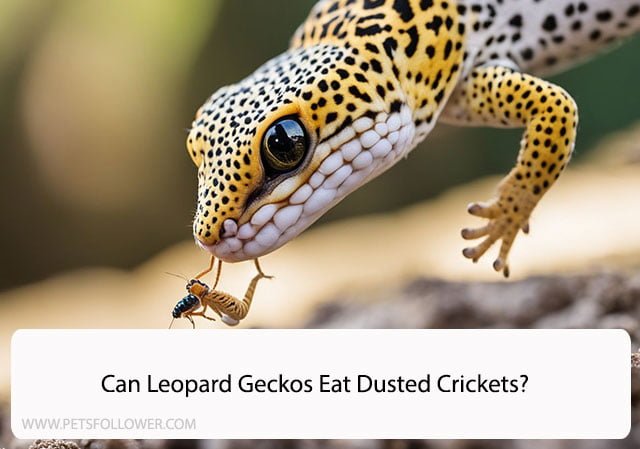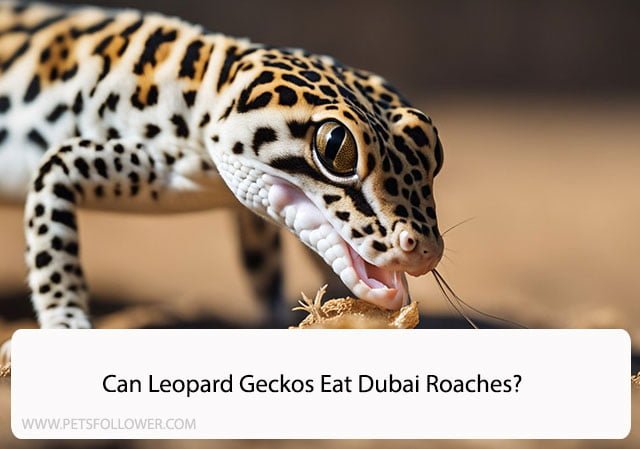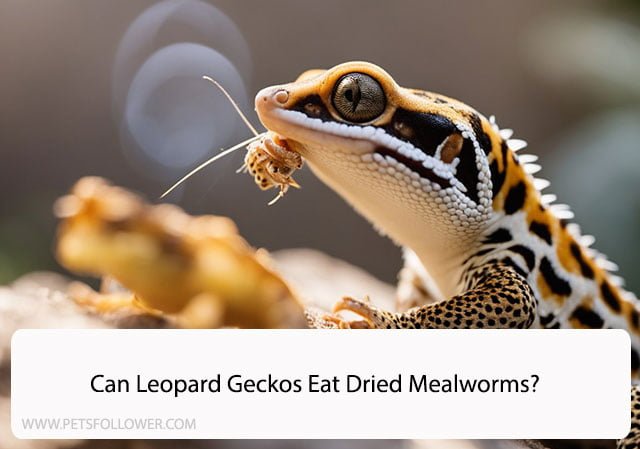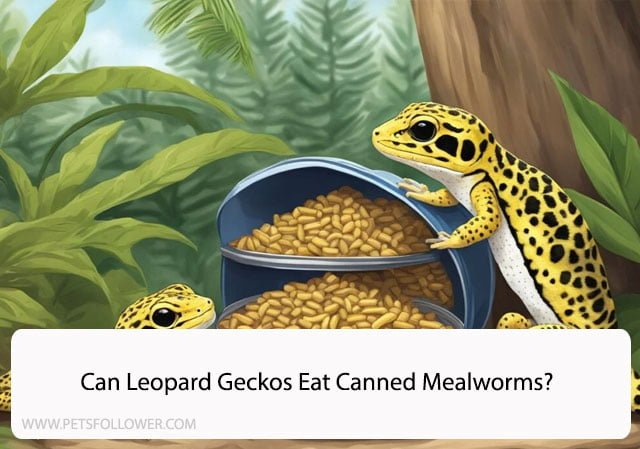Leopard geckos are fascinating creatures that make great pets. With their unique appearance and docile nature, they have become increasingly popular among reptile enthusiasts. As with any pet, it is important to provide them with a balanced diet that meets their nutritional needs. One question that often arises is whether or not leopard geckos can eat cheese.
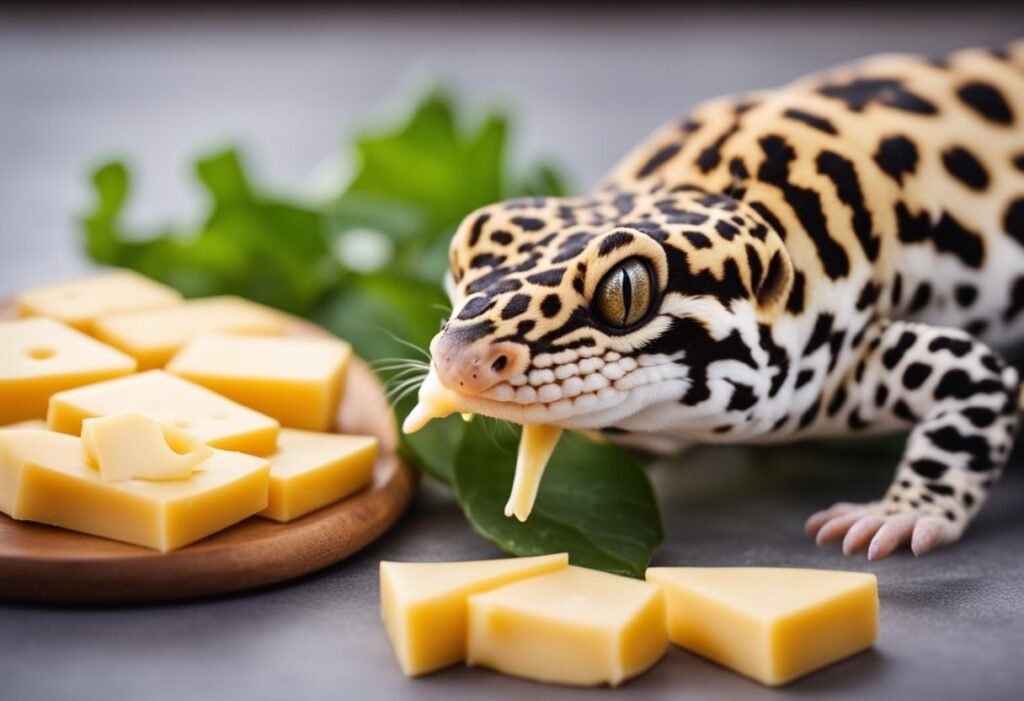
While cheese is a common food item for humans, it is not a natural part of a leopard gecko’s diet. In the wild, they primarily eat insects such as crickets, mealworms, and waxworms. These insects provide the necessary protein, vitamins, and minerals that leopard geckos need to thrive. However, some pet owners may be tempted to offer their geckos cheese as a treat or to supplement their diet.
It is important to note that cheese is not a suitable food for leopard geckos. Cheese is high in fat and lacks the essential nutrients that these reptiles need. Feeding cheese to leopard geckos can lead to health problems such as obesity and nutritional deficiencies. In addition, some types of cheese contain high levels of salt, which can be harmful to these animals.
Leopard Gecko Dietary Basics
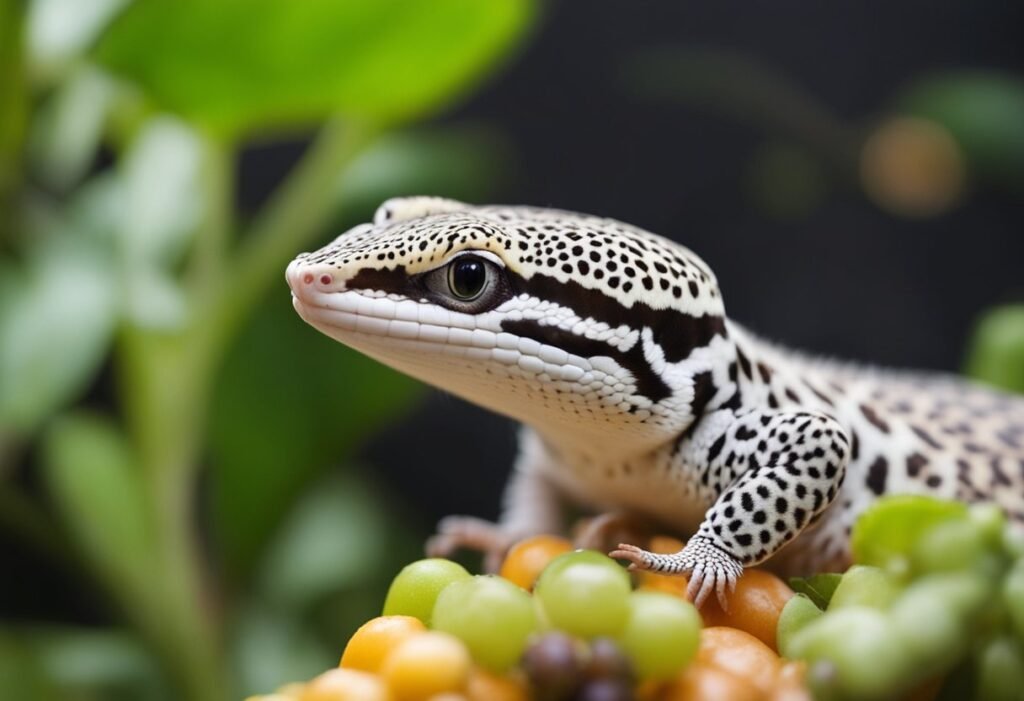
Nutritional Needs
As leopard geckos are insectivores, their diet should consist mainly of insects. They require a balanced diet of protein, fat, and carbohydrates to maintain their health. It is important to provide them with a variety of insects to ensure they receive all the necessary nutrients.
Leopard geckos also require calcium and vitamin D3 for proper bone development. Calcium can be provided through supplements or by feeding them insects that have been dusted with calcium powder. Vitamin D3 can be obtained through exposure to UVB lighting.
Common Foods
The most commonly fed insects to leopard geckos are crickets and mealworms. Other options include waxworms, superworms, and dubia roaches. It is important to avoid feeding them insects that are too large as it can cause impaction.
Leopard geckos should not be fed fruits, vegetables, or dairy products such as cheese as they are not part of their natural diet and can cause digestive issues. It is also important to avoid feeding them insects that have been caught in the wild as they may contain harmful pesticides.
In summary, leopard geckos require a balanced diet of insects and supplements to maintain their health. It is important to provide them with a variety of insects and avoid feeding them foods that are not part of their natural diet.
Cheese and Reptiles
When it comes to feeding our leopard geckos, it’s important to ensure they receive a balanced diet. While we may be tempted to share some of our favorite human foods with our pets, it’s important to do our research first. In this section, we’ll take a closer look at whether cheese is a suitable food for reptiles.
Lactose Intolerance in Reptiles
Many reptiles, including leopard geckos, are lactose intolerant. This means they lack the necessary enzymes to break down lactose, a sugar found in milk and dairy products. Feeding your leopard gecko cheese or other dairy products can lead to digestive issues, including diarrhea and bloating.
Cheese Nutritional Content
Cheese is a good source of protein and calcium, two essential nutrients for reptiles. However, it’s important to note that cheese is also high in fat and sodium, which can be harmful to your leopard gecko if consumed in excess. Additionally, the nutritional content of different types of cheese can vary greatly, so it’s important to do your research and choose a cheese that is low in fat and sodium.
In conclusion, while cheese may seem like a tasty treat for your leopard gecko, it’s best to avoid feeding it to them. Leopard geckos are lactose intolerant and may experience digestive issues if they consume dairy products. Additionally, while cheese can provide important nutrients, it’s important to choose a low-fat, low-sodium option if you do decide to feed it to your pet.
Risks of Feeding Cheese to Leopard Geckos
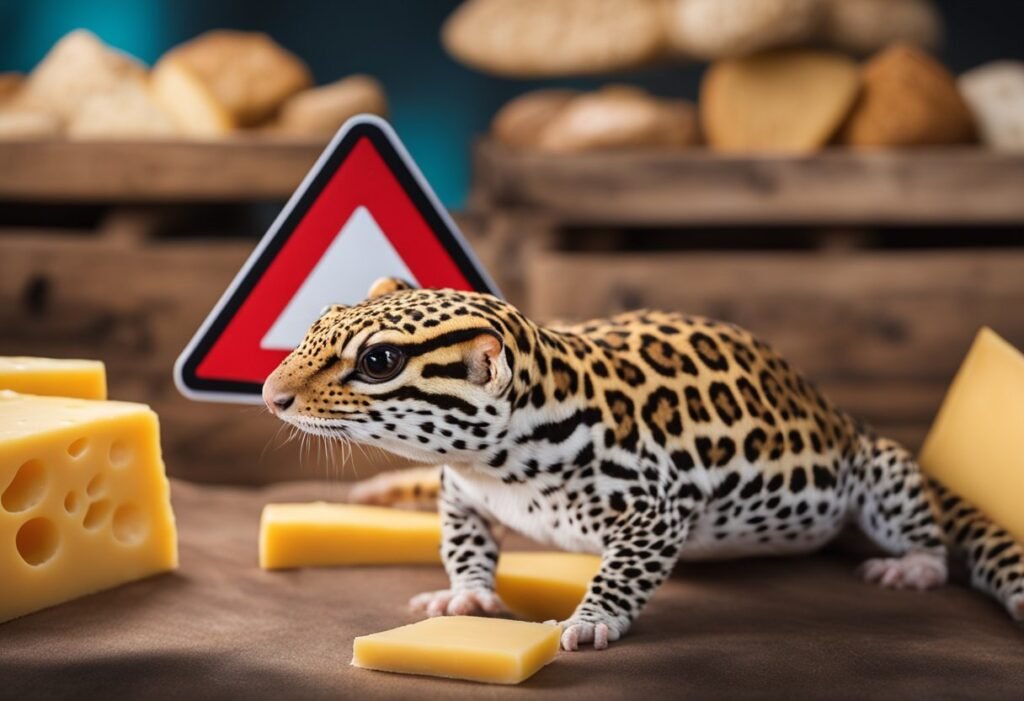
Leopard geckos are insectivorous, which means they primarily feed on insects. While they may occasionally eat fruits or vegetables in the wild, their digestive system is not designed to handle dairy products like cheese. In fact, feeding cheese to leopard geckos can pose several risks to their health.
Digestive Issues
Leopard geckos have a sensitive digestive system that is adapted to digesting insects. Cheese, on the other hand, is high in fat and can be difficult for leopard geckos to digest. Feeding cheese to leopard geckos can lead to digestive issues such as bloating, diarrhea, and constipation. These digestive issues can cause discomfort and may even lead to serious health problems if left untreated.
Nutritional Imbalance
Cheese is not a natural part of a leopard gecko’s diet and does not provide the essential nutrients that they need to stay healthy. Feeding cheese to leopard geckos can lead to nutritional imbalances that can negatively impact their health. For example, cheese is high in fat and low in protein, which can cause leopard geckos to become overweight and may lead to other health problems such as liver disease.
In conclusion, while it may be tempting to offer your leopard gecko a piece of cheese as a treat, it is best to avoid feeding cheese to leopard geckos altogether. Instead, stick to a diet of live insects and provide your leopard gecko with the proper nutrition and care that they need to thrive.
Safe Feeding Practices
Recommended Diet
When it comes to feeding leopard geckos, it is important to provide them with a balanced and nutritious diet. While leopard geckos are primarily insectivores, they can also benefit from the occasional supplementation of vitamins and minerals.
It is recommended to feed your leopard gecko a diet consisting of live insects such as crickets, mealworms, and waxworms. These insects should be gut-loaded with nutritious foods such as vegetables and fruits before being fed to your gecko. Additionally, it is important to dust the insects with a calcium and vitamin D3 supplement to ensure that your gecko is receiving adequate amounts of these essential nutrients.
While some sources suggest that leopard geckos can eat cheese, it is not a recommended part of their diet. Cheese is high in fat and lacks the necessary nutrients that leopard geckos require for optimal health. Therefore, it is best to stick to a diet of live insects and supplements for your leopard gecko.
Feeding Frequency
Leopard geckos should be fed every two to three days. It is important not to overfeed your gecko as this can lead to obesity and other health problems. Additionally, it is important to monitor your gecko’s food intake and adjust the feeding frequency accordingly.
For juvenile leopard geckos, it is recommended to feed them more frequently than adults as they require more energy for growth and development. As your gecko matures, you can gradually decrease the feeding frequency to avoid overfeeding.
In conclusion, feeding your leopard gecko a balanced and nutritious diet is essential for their health and well-being. Stick to a diet of live insects and supplements, and avoid feeding them foods that are high in fat and lacking in nutrients. Monitor your gecko’s food intake and adjust the feeding frequency accordingly to ensure that they are receiving the appropriate amount of food.
Alternatives to Cheese
If you are looking for other food options to feed your leopard gecko besides cheese, there are plenty of alternatives to choose from. Here are some options that can provide your gecko with the necessary nutrients they need:
Insect Options
Leopard geckos are insectivores, which means they require a diet that consists of insects. Some insect options that are safe for your gecko to consume include:
- Crickets
- Mealworms
- Dubia roaches
- Waxworms (as a treat)
It is important to note that you should only feed your gecko insects that are appropriately sized for them. Additionally, make sure the insects are gut-loaded (fed a nutritious diet) and dusted with calcium and vitamin D3 supplements before feeding them to your gecko.
Supplements and Vitamins
In addition to a diet of insects, leopard geckos require supplements and vitamins to ensure they are receiving all the necessary nutrients. Here are some supplements and vitamins that can be added to your gecko’s diet:
- Calcium powder
- Vitamin D3 powder
- Multivitamin powder
These supplements can be dusted onto your gecko’s food before feeding. It is important to follow dosage instructions and not over-supplement, as this can lead to health issues.
Overall, there are plenty of safe and nutritious alternatives to cheese that you can feed your leopard gecko. By providing a varied diet of insects and supplements, you can ensure your gecko stays healthy and happy.
Frequently Asked Questions
What are the potential health risks of feeding dairy to leopard geckos?
Dairy products like cheese are not a natural part of a leopard gecko’s diet. While small amounts of cheese may not be immediately harmful, over time it can lead to health problems such as obesity, digestive issues, and even liver disease. It is best to avoid feeding dairy products to leopard geckos altogether.
Are there any human foods that are safe for leopard geckos to consume?
Leopard geckos should primarily be fed a diet of live insects such as crickets, mealworms, and dubia roaches. However, some human foods can be given as occasional treats. Safe options include small amounts of fruits like bananas and berries, as well as cooked and mashed sweet potatoes or carrots.
Is it harmful for leopard geckos to eat cooked foods like scrambled eggs?
Cooked foods like scrambled eggs are not harmful to leopard geckos in moderation. However, they should not be a regular part of their diet as they lack the necessary nutrients that live insects provide.
What is the ideal diet for a leopard gecko?
The ideal diet for a leopard gecko consists of a variety of live insects such as crickets, mealworms, and dubia roaches. It is important to provide a balanced diet that includes calcium and vitamin supplements to prevent health issues like metabolic bone disease.
Which insects are considered safe and nutritious for leopard geckos?
Safe and nutritious insects for leopard geckos include crickets, mealworms, dubia roaches, and waxworms. It is important to avoid feeding wild-caught insects as they may carry parasites or pesticides.
What should never be included in a leopard gecko’s diet?
Leopard geckos should never be fed insects that are too large, as they can cause choking or impaction. Insects that are toxic or carry parasites, such as fireflies and wild-caught insects, should also be avoided. Additionally, leopard geckos should not be fed fruits or vegetables as a primary part of their diet.


